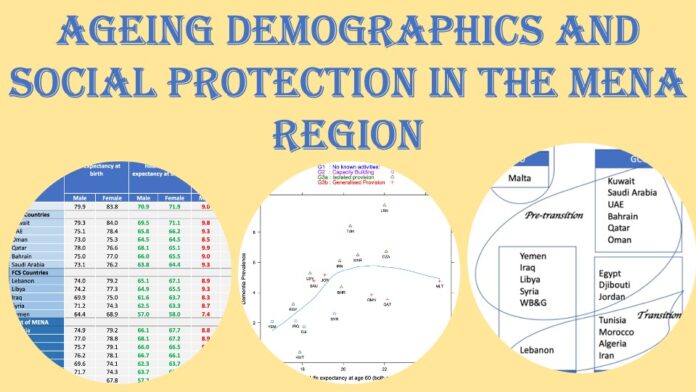The Middle East and North Africa (MENA) region, long characterised by its youthful population and high fertility rates, is transforming rapidly and profoundly. In a ground-breaking report commissioned by the World Bank, we delve into the dramatic shifts towards an ageing population in the MENA region, a phenomenon marked by declining fertility and mortality rates that outpace historical trends in many European countries.
But what sets this transformation apart is the unique coexistence of older and younger populations, unlike Europe, where ageing has primarily been the dominant demographic narrative. Recent surges in fertility rates imply that while population ageing is happening at an unprecedented pace, the cohorts entering old age will be sizable in numbers, creating significant societal and economic pressures. These pressures, in turn, necessitate policy and practical interventions and a fundamental shift in the cultural and societal perspectives on ageing.
Despite these challenges, opportunities are embedded within the region’s demographic makeup. The youth bulge, a prominent feature of the MENA landscape, presents a potential demographic dividend that, if harnessed effectively, could yield substantial benefits. However, seizing this window of opportunity requires swift and well-informed actions.
A critical assessment of the current landscape presented in this report reveals a pressing concern: most countries in the MENA region need to pay more attention to the ramifications of this demographic shift. Policy responses have been limited and fragmented, leaving the region ill-prepared to address the challenges and opportunities of an ageing population.
The MENARAH report, however, goes beyond identifying the problem; it offers a comprehensive analysis of the key drivers and implications of population ageing in the MENA region. This report provides a timely platform for considering tailored responses for different groups of countries within the region. It recognises that ageing experiences vary across GCC countries, those grappling with fragile and conflict-ridden situations, and other nations in the MENA region.
MENARAH_AgeingMENA_FINALThe fourth Madrid International Plan of Action on Ageing (MIPPA) review, 2022, marked two decades of international engagement in addressing ageing-related issues. This review represents a pivotal moment for countries in the MENA region to formulate short to medium-term action plans to address population ageing and its attendant dynamics.
Furthermore, the global spotlight on societal ageing is reaffirmed by the United Nations Decade of Healthy Ageing (2021-2030), which aligns with the Sustainable Development Goals for 2030. The findings and discussions within the MENARAH report underscore the existence of commonalities in the ageing experience across the region. However, it also highlights that different groups of countries exhibit distinct characteristics in their approach to ageing.
The MENA region stands at the precipice of profound demographic change, a change that outpaces the existing cultural, political, and economic structures. For instance, the region’s retirement and pension systems are built on outdated life expectancy trends and expectations, with retirement ages set well below the potential for healthy and active ageing.
One glaring issue lies in the average retirement age in the MENA region, which stands at 60 for men and 55-60 for women, with early retirement options available for some as young as 40. However, the effective average retirement age is around 58 for men and 55 for women. Given the increased longevity of the population, these low retirement ages not only pose economic challenges but also carry substantial adverse health and social implications for individuals in their later years.
Moreover, the region’s long-term care (LTC) model primarily relies on informal care provided by families or community groups. To meet the growing demand for LTC, MENA countries must develop new care economies and markets. These new LTC economies hold several advantages, including creating job opportunities, especially for women in a region where female unemployment rates are alarmingly high in some countries.
The region’s potential lies in harnessing the labour force of its youth bulge and tapping into the emerging silver economy. This strategy presents a monumental opportunity to counter the financial implications of increased health and social care needs associated with population ageing.
Investing in data and knowledge generation is paramount for MENA countries to ensure evidence-based policy and practice development. This data will be essential for implementing reforms and monitoring and evaluating new initiatives, assessing their effectiveness, and ensuring they reach the intended beneficiaries.
While some reforms may require time for implementation, addressing the immediate needs of vulnerable older populations affected by poverty, illness, or isolation is a moral imperative. Adopting a family-based, holistic approach to long-term care, supported by a formal set of LTC services and support mechanisms, aligns with the cultural context of the region. Within this framework, empowering older individuals and promoting healthy behaviours and self-care can prove cost-effective and rewarding.
Given past trends of high fertility rates, incoming cohorts of older individuals are expected to be substantial, placing sudden pressures on limited services. Preparing these groups for old age is paramount, including promoting healthy behaviours and financial readiness for later life. Adequate policy responses, such as establishing LTC markets and improving the retention and re-employment of older individuals in the labour market, can mitigate some of the anticipated economic effects of population ageing. However, the specific policy responses must be tailored to the cultural, socio-economic, and political factors unique to each country in the region.
In conclusion, the MENARAH report offers a comprehensive look into the multifaceted challenge and opportunity posed by population ageing in the MENA region. While the demographic transformation is swift and substantial, it carries the potential for a brighter future if met with timely and well-informed actions. This report serves as a vital resource for policymakers, researchers, and stakeholders seeking to navigate the MENA region’s complex ageing landscape, ultimately shaping the region’s future in an era of demographic change.
to request a free copy of the report.
This report supported a recent World Bank publication, Built to Include: Reimagining Social Protection Systems in the Middle East and North Africa.




